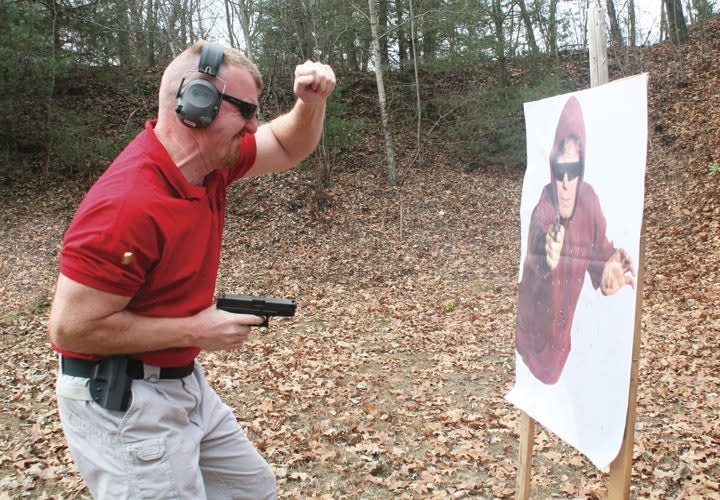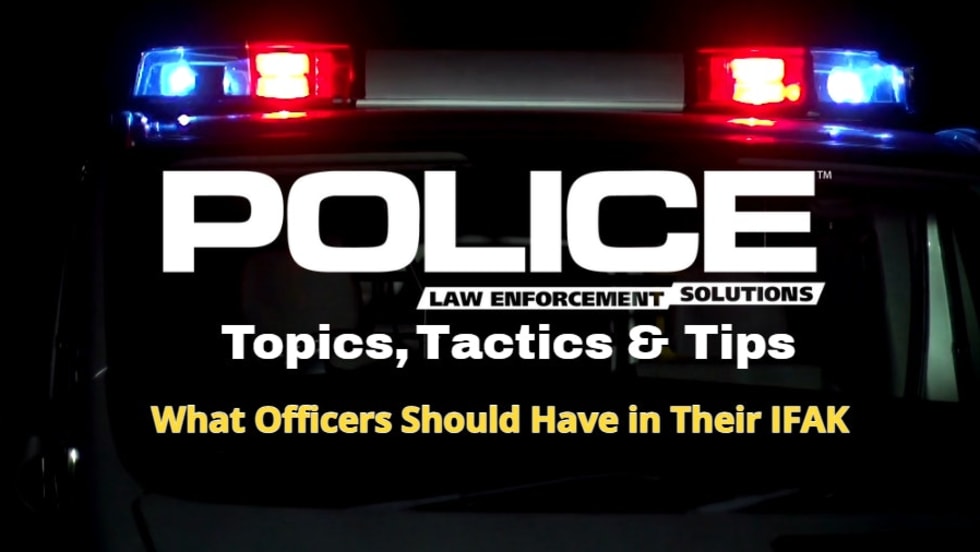The majority of officer-involved shootings are up close and personal. Yet there are still a number of agencies that train and have qualification courses with the handgun at the 25-yard line and ignore training their officers how to engage threats at 5 yards or even one yard.
How does that make any sense when most shootings are up close and personal?
There was even a Detroit-area officer who was involved in a shooting at less than one foot. This officer was placing a suspect in handcuffs when the suspect drew a handgun from his waistband and fired over his shoulder at the officer. The officer shoved the suspect to gain distance and reaction time, then drew his firearm, and shot and killed the offender.
Even though we are told to keep our distance from subjects to give us time to react to a threat, that's not always realistic. We have to move in and close the distance to deal with people on a daily basis, and our training should reflect that.
Get Real
Which is one reason that I am a big advocate of point shooting training.
Some law enforcement firearms instructors argue that it's unnecessary to train shooters to engage targets at close range if they can score sighted hits from 25 yards. My advice to those trainers is to pull your heads out of whatever crevices you have them in and look at the dynamics of an actual OIS. Our tactics are totally different at 25 yards than they should be at one foot, or two feet, or 10 feet, or even 21 feet.
If you're a trainer who is still running a qualification course involving the 25-yard line, ask yourself where most of your students experience the most trouble hitting the target. At the three-yard line? Or the 25-yard line? I bet most shooters have more trouble hitting the target at 25 yards. Which means your firearms trainers end up spending more of their precious, and limited, training time out at the 15- or 25-yard lines. Does that prepare your students for the most likely threats they will face on the job? Of course it doesn't.
Your training should reflect the realities of the street, and that includes your firearms training. You should be training with point shooting.
The Counter Arguments
I'm not going to get into every argument the anti-point shooting crowd likes to throw out there, but let me go over a few favorites.
The first argument against point shooting training vs. sighted fire training is officers will fall back onto their training under stress. The argument is that if you train an officer to use his or her sights all the time, then he or she will use them under the stress of an actual fight. It is true that you will fall back onto your training under stress, but only if that training is consistent with your instinctive responses to that stress.
If you train an officer to always use sights, then what happens when a loss of near vision kicks in, which happens under stress, and the officer can't focus on the sights at less than four feet? And do you really think you're going to be focused on your sights when someone is shooting at you over his or her shoulder from less than a foot away? Of course you won't; you won't even use-the-front-sight-only shooting method that is so often touted by those who refuse to teach point shooting skills to their officers.
How about when tunnel vision kicks in, where the officer's vision is narrowed dramatically and most often focused on the source of the threat, which is the weapon? It's one of your instinctive responses when your fight-or-flight instinct kicks in is that you will naturally focus on the source of the threat, which is why so many people in gunfights are shot in the hands that held their weapons.
The second biggest argument that's thrown out there by the anti-point shooting crowd is liability. You are liable for every round you send down range, whether you're using your sights or point shooting. Those who have no understanding, or refuse to even take a look at any point shooting training, think that point shooters are just "spraying and praying." Although point shooting is easy to learn because it plays into natural body mechanics and therefore can be used under stress, there's a little more to it than just sticking your gun out there and pulling the trigger.
When confronted with this question of liability you should ask yourself about your own firearms training. Does your current firearms training reflect the realities of the street? Are you teaching close-quarters shooting skills, shooting on the move, weapon retention shooting, the shove and shoot drill, and any other close-quarter skills that reflect the reality of what the officers in your department face on the street? There is more liability in not teaching point shooting than there is in teaching it.
Gun grabs are a reality of the street and a number of departments train weapon retention skills. If you're teaching weapon retention shooting tactics, or the shove and shoot drill, or close-quarter hip shooting skills, you are teaching point shooting—without even realizing it. When the "liability question" comes up from someone who wants to argue against point shooting, the first question I ask back is: Are you doing any weapon retention shooting?
Instinct and Reaction
The dumbest argument against point shooting goes something like this. "If point shooting was instinctive we'd all be born with guns in our hands."
Shooting is not instinctive. But point shooting takes advantage of your natural body mechanics and your physical and mental responses to the extreme stress of being confronted with a deadly threat. When your fight-or-flight response kicks in and you have a huge dump of adrenaline, you start to breathe rapidly (almost to the point of hyperventilation); you start to have body tremors (hands shaking); and when you start suffering from a loss of near vision, or tunnel vision, that's when you'll fall back onto your point shooting training.
Do officer-involved shootings happen at greater than bad breath distances? Yes, they do, and you need to remember that, but don't waste what little precious time and money you have for training teaching officers to shoot at the 25-yard line. Do some research into the shootings in your department, or any police shootings that have occurred in the surrounding jurisdictions, and train accordingly. If the majority of your shootings are up close and personal, then you need to be doing some point shooting training.
Michael T. Rayburn is the author of "Combat Gunfighting" and four other books. He is a 30-year veteran of law enforcement, a former adjunct instructor at the Smith & Wesson Academy, and the lead instructor for Rayburn Law Enforcement Training. He can be reached at www.combatgunfighting.com.











